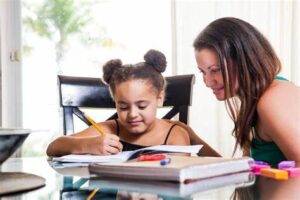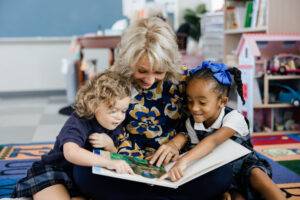Table of Contents
Adequate preparation for big school for toddlers is important for their future academic success and overall development. To support this important educational journey, parent-teacher associations (PTAs) play a significant role.
PTAs come into the picture because of their significant involvement in your children’s transition. They play their role by fostering communication, providing parental involvement opportunities, and advocating for quality education.
We at Omega Pediatrics pulled up information to come up with a comprehensive guide on how to prepare your toddlers for big school. Also included is the involvement of PTAs in this important transition.
Transition to Big School: How Parents Can Help
A strong foundation for your toddler’s academic success is adequate preparation for big school.
Higher levels of school readiness, better social skills, and good academic performance manifest in children with good preparation.
Emotional and Social Readiness
Transitioning to big school is a milestone! However, it’s not spared from emotional challenges and social adjustments. Prepare your toddlers to embrace these changes with confidence and ease. We will explore two key aspects:
- Separation anxiety
Comfort your child gradually through the transition. Introduce short separations and give reassurance of their return. Also, encourage positive relationships with caregivers.
A sense of security and open communication can give comfort during the separation. This helps your toddler overcome the challenge and develop resilience to change.
- Build social skills and confidence
Engage in playdates, encourage social interactions, and promote cooperative activities. Allow your toddler to join group activities through clubs or programs in the community to enhance their social abilities. They gain new friends and boost their confidence.
Academic Preparations

This is a crucial element in fostering a seamless transition to a big school environment.
- Language and communication skills
Your toddlers develop these skills through reading books and exposing them to a rich vocabulary. Engage with them and teach them how to express themselves, active listening, and storytelling skills.
Your toddlers develop communication skills to engage with their teachers and classmates when they are in big school.
- Literacy and numeracy skills
Help your children develop these skills by establishing a reading routine every day by providing books that match their interests and age. Also, engage them in interactive reading sessions.
Boost their numeracy skills through play, like counting objects or identifying numbers. These help your toddlers develop a strong mathematical foundation.
Practical Preparation
Other than emotional and academic factors, practical preparations are equally important in the transition. Here are some ways to consider:
- Have pre-school routines
Establish routines at home to enable toddlers to adjust to the more rigid school environment. Enforce a schedule for waking up, mealtime, playtime, and bedtime. A schedule enables them to develop a sense of predictability and stability.
Routines promote organization, time management, and a smooth transition to the structured routines of big school.
- Develop independence and self-help skills

Promote your child’s independence by teaching them how to dress up and taking care of their hygiene. Engage them in household chores that are suitable for their age.
These skills teach your child self-reliance, confidence, and a sense of competence, preparing them to cope with the demands of big school more effectively.
Preparing Your Toddler to Big School: Strategies for Parents
As the transition to big school approaches, equip your toddlers with the necessary skills and experiences to thrive in this new educational journey. Here are a range of effective strategies for a smooth and successful transition.
1. Visit the new school or classroom to familiarize toddlers with the environment and ease anxieties. You can arrange to meet the teachers, explore the facilities, and engage in playful activities to create a positive association with the new setting.
2. Role-play school routines and scenarios to rehearse the toddlers on the variations. Create pretend play classrooms, use toys as classmates, and simulate daily activities so toddlers get familiar with common situations they may encounter in big school.
3. Encourage independence in daily activities, such as dressing, eating, and tidying up. This fosters their self-confidence to handle tasks independently at school.
You can then gradually incorporate age-appropriate responsibilities, offer praise and encouragement, and provide guidance when needed to support your toddlers’ independence.
4. Read and be a storyteller at home to develop a love for learning and enhance their language skills. Read with them regularly, ask open-ended questions, and engage in discussions about the story.
This activity cultivates a passion for reading, expands vocabulary, and stimulates imagination and critical thinking.
5. Engage in educational activities and games to promote active learning and cognitive development, making learning enjoyable. Provide age-appropriate puzzles, building blocks, or educational apps that induce problem-solving, creativity, and logical thinking.
These activities make learning enjoyable and help develop essential skills needed for academic success.
6. Introduce basic math concepts through play, which helps your toddlers develop a strong foundation in numeracy. You can incorporate counting games, sorting activities, and simple math exercises into playtime.
This interactive approach makes math fun and accessible, enhancing your toddlers’ number sense and critical thinking skills.
7. Organize playdates and social interactions with peers to develop social skills in a comfortable environment. Arrange the encounters with classmates and neighbors, and encourage sharing, turn-taking, and cooperative play.
These experiences promote socialization and empathy and help develop positive relationships.
8. Encourage sharing, cooperation, and empathy in their daily interactions with their toddler peers. Encourage your children to take turns, engage in collaborative projects, and express empathy towards others.
These cultivate important social skills, contribute to a positive classroom environment, and help toddlers establish meaningful connections with teachers and peers.
9. Let your child join playgroups or preschool programs. This provides structured social settings where they can interact with other children and learn valuable social skills.
These environments offer opportunities for group activities, problem-solving, and cooperation, fostering social development and preparing your toddlers for the social dynamics of big school.
The Role of Parent-Teacher Associations (PTAs)
Parent-Teacher Associations (PTAs) are collaborative organizations that bring together parents, teachers, school staff, and the school community, creating a support network for children’s educational journey.
These PTAs provide a platform for effective communication and parental involvement opportunities. PTAs act as advocates for quality education and work towards enhancing the overall educational experience for all students.
1. Parental involvement through PTAs enhances communication and collaboration between home and school, strengthens the partnership between you and your child’s teachers, and provides support for school programs and initiatives.
2. Parental involvement also creates opportunities for parent education and engagement, empowering you to actively contribute to your child’s educational experience.
3. PTAs actively contribute to the success of school programs and initiatives. By volunteering your time and resources, you support the school’s extracurricular activities, fundraising events, and educational projects.
4. PTAs organize workshops, seminars, and informational sessions that equip you with the knowledge and skills necessary to support your child’s education. These events cover topics such as school readiness, parenting strategies, and child development.
Ways PTAs Can Support Toddlers’ Transition to Big School
PTAs play a significant role in supporting your toddlers’ transition to big school through various initiatives and programs. Here are a few ways:
1. Orientation and Transition Programs
PTAs organize orientation programs specifically designed for incoming toddlers and their parents. These programs familiarize families with the school environment, introduce key staff members, and provide information about the curriculum and policies.
These initiatives help alleviate anxieties and facilitate a smooth transition for toddlers and their families.
2. Parent Workshops on School Readiness
PTAs conduct workshops that focus on school readiness, offering guidance on how to prepare your toddlers for the academic and social aspects of big school.
The workshop topics may cover fostering independence, supporting literacy and numeracy skills, and addressing separation anxiety.
3. Volunteer Opportunities
PTAs offer volunteer opportunities for you, as parents, to actively participate in school activities. You can volunteer in classrooms, assist with field trips, or contribute to fundraising efforts.
Building Parent-Teacher Partnership
A strong parent-teacher partnership is instrumental in fostering a supportive and enriching educational experience for your children. This collaboration creates a united front that nurtures your child’s academic progress and social development.
1. Communicate with Your Child’s Teachers
Attend parent-teacher meetings and conferences, enabling you to connect with your child’s teachers. These meetings foster mutual trust, promote a shared vision, and enable parents and teachers to work together in the best interest of the child.
Through the meetings, you’re informed of your child’s academic progress, classroom activities, and upcoming events. Utilize communication channels, such as email, online portals, or phone calls, to engage in regular dialogue with teachers.
Regular communication ensures that you and the teachers can address any challenges or opportunities promptly and collaboratively.
2. Get Involved in School Activities
You can participate in PTA meetings and events to connect with other parents, engage in discussions about school-related matters, and contribute to decision-making. You can propose ideas and collectively work towards enhancing the school community.
You can also volunteer for classroom activities or field trips, assisting teachers and engaging with other students. This gives you firsthand insight into classroom dynamics, fosters positive relationships with teachers and peers, and contributes to memorable learning experiences.
3. Support the School Community
You can contribute to fundraising and school projects. Your participation demonstrates your commitment to the school’s mission and goals by donating resources or organizing events.
You also encourage other parents to get involved by sharing your positive experiences. You may be able to inspire and motivate other parents to actively participate in PTAs, attend school events, and contribute to the overall growth of the school.
Give Your Toddler the Best Possible Start to their Educational Journey
You may be stressed about how to transition your toddler to big school seamlessly. With enough preparation and PTAs to guide you, you’ll surely be able to achieve it.
Empower your children to thrive academically, socially, and emotionally as they embark on their educational journey today!
We at Omega Pediatrics ensure that your toddler is well-prepared for school. We provide a lot of valuable content and resources that may help you further prepare your child.
FAQ
How can parents help toddlers cope with separation anxiety during the transition to big school?
Parents can ease separation anxiety by gradually introducing short separations, providing reassurance, and encouraging positive relationships with caregivers. Open communication and a sense of security help toddlers overcome separation challenges and develop resilience.
What are some practical ways to prepare toddlers academically for big school?
Parents can foster academic readiness by engaging in activities that develop language and communication skills, such as reading books and interactive storytelling. Additionally, promoting literacy and numeracy through daily routines and play helps toddlers build a strong foundation for learning.
How can parents encourage independence and self-help skills in toddlers preparing for big school?
Parents can promote independence by establishing routines, teaching self-care tasks like dressing and hygiene, and involving toddlers in age-appropriate household chores. These skills instill confidence, self-reliance, and competence, preparing toddlers to handle the demands of big school effectively.
What strategies can parents implement to support toddlers’ transition to big school?
Parents can visit the new school or classroom, engage in role-playing school routines, encourage independence in daily activities, read and tell stories at home, engage in educational activities and games, organize playdates, and enroll toddlers in playgroups or preschool programs.
How do Parent-Teacher Associations (PTAs) contribute to toddlers’ transition to big school?
PTAs support toddlers’ transition by organizing orientation programs, parent workshops on school readiness, and volunteer opportunities. They foster communication and collaboration between parents and teachers, provide resources and support for school initiatives, and build a strong parent-teacher partnership for the benefit of children’s educational journey.




